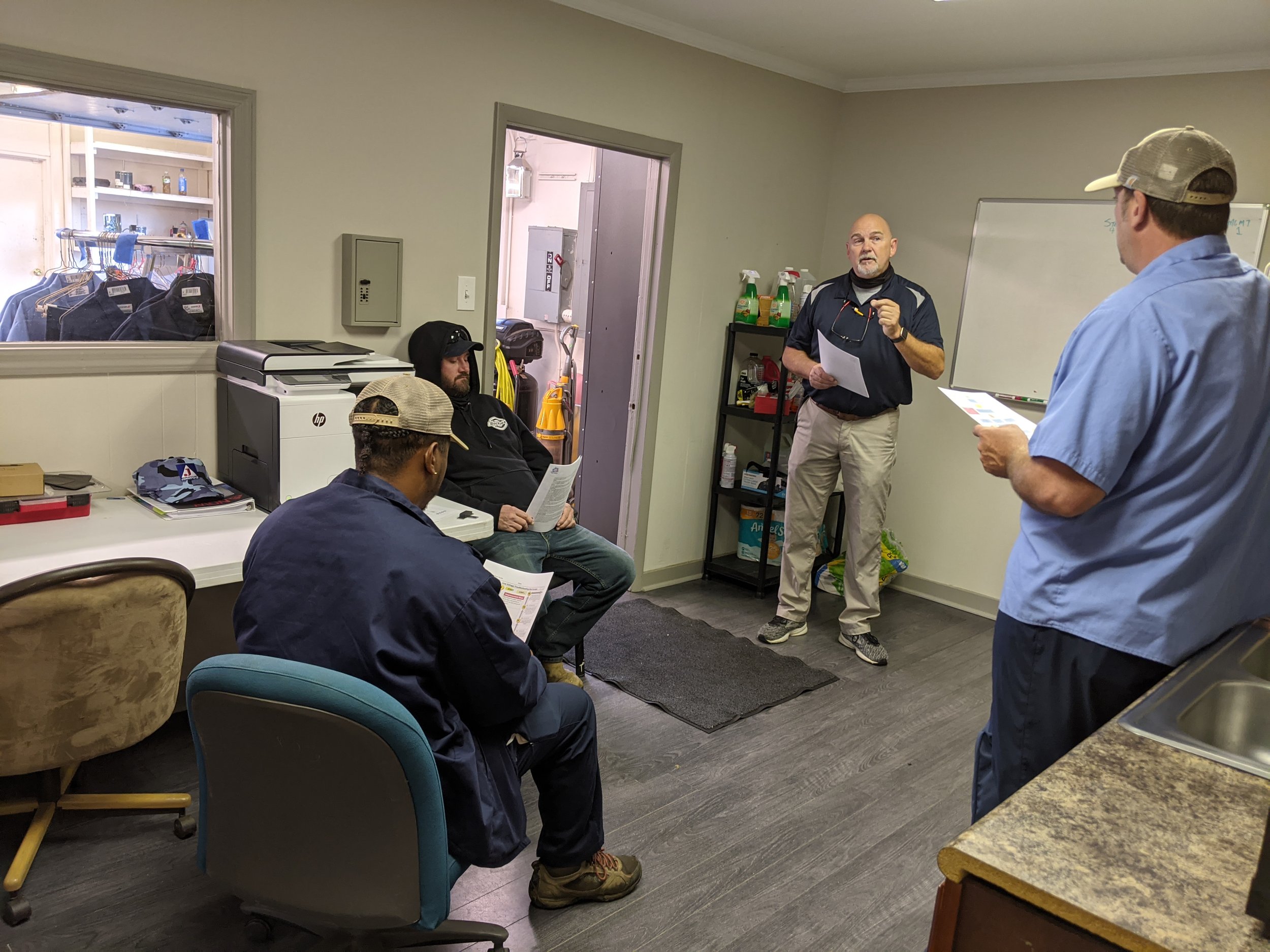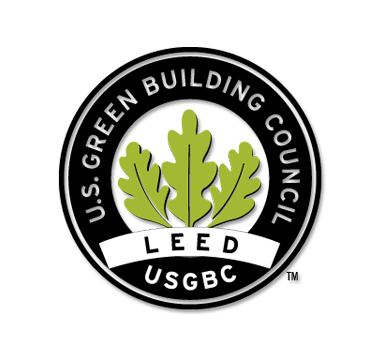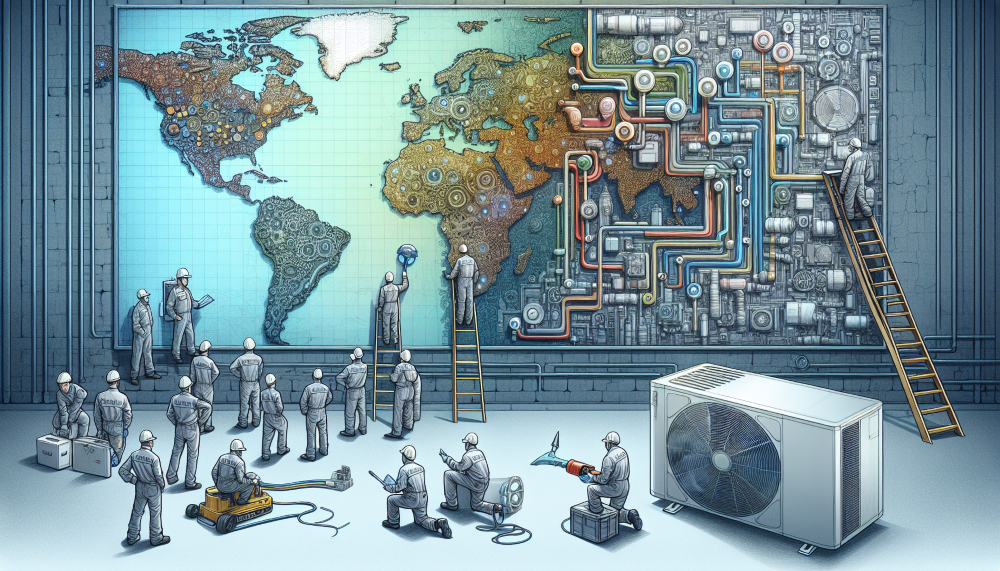HVAC Business Startup Cost: Essential Budget Breakdown
HVAC business startup costs, including essential tools, vehicles, licenses, and marketing, are crucial to understand when planning your budget. This article breaks down each expense to guide you through the process of starting your HVAC business, focusing on the HVAC business startup cost.
Key Takeaways
Starting an HVAC business requires a significant initial investment, including essential tools, equipment, and vehicles, with costs ranging from $2,000 to over $100,000.
Ongoing operational costs such as technician wages, vehicle maintenance, and insurance are crucial for maintaining efficient business operations and high-quality service.
Effective marketing, including both digital strategies like SEO and traditional methods like local ads, is vital in attracting customers and establishing a strong brand presence.
Quick Links:
Initial Investment for HVAC Business
Kickstarting an HVAC business demands a sizeable initial investment. Costs could vary from $2,000 to well above $100,000, influenced by numerous factors. Key expenses encompass indispensable HVAC tools, equipment, and vehicles. It would be prudent to commence with a smaller scale and expand progressively as the business evolves.
A comprehensive business plan, meticulously planned, is instrumental in projecting expenses and revenue forecasts, encompassing initial investment and long-term tactics.
Essential HVAC Tools and Equipment
Essential basic HVAC tools and equipment for an HVAC business include:
Cordless power drill
Shears
Voltage testers
Ladders
Furnaces
Air conditioners
The cost of these tools can add up to several thousand dollars, but they are necessary for efficient operations.
Allocating funds towards high-quality equipment from the onset can lead to long-term savings by decreasing repair and replacement expenditures.
Costs of Vehicles for HVAC Business
Vehicles play a pivotal role in ferrying HVAC equipment and technicians to job locations. Costs for vehicles include purchasing or leasing a vehicle large enough to carry all necessary tools and equipment. Additionally, commercial car insurance is a must to cover vehicles used for business purposes.
Maintaining your vehicles in a dependable and robust condition is vital for delivering prompt and efficient service.
One-Time Expenses
One-time expenses to start an HVAC business include certification and licensing fees, business name registration, and permits. These HVAC business startup costs can range from a few hundred to a few thousand dollars depending on location and business specifics. For HVAC business owners, it’s essential to consider these expenses when planning their budget.
Business name registration and acquisition of required licenses guarantee adherence to local laws and regulations, laying a firm groundwork for your operations.
Ongoing Operational Costs
After the HVAC business is operational, recurring operational costs encompass:
Technician wages
Payroll for office staff
Materials
Equipment
Vehicle upkeep
Insurance
These costs are essential to keep the business operating smoothly and maintaining a high level of service.
Maintenance Services and Repairs
Efficient operations and customer satisfaction demand regular upkeep and prompt repairs of HVAC systems by reliable HVAC companies, including your own HVAC company. Maintenance of company vehicles includes routine checks, oil changes, and tire rotations.
Ensuring HVAC systems, including air conditioning, are well-maintained helps prevent unexpected failures and extends their lifespan.
Insurance and Liability Coverage
Insurance coverage is paramount to shield from diverse risks in the HVAC industry. General liability insurance covers claims of bodily injury or property damage, while workers’ compensation insurance covers medical expenses and lost wages for employees injured on the job. An HVAC business can expect to pay several hundred dollars per month for a comprehensive insurance policy.
Employee Salaries and Benefits
Recruiting certified HVAC technicians, including a skilled HVAC technician, is key to delivering superior service and expanding your enterprise. The median annual salary for HVAC professionals is $50,590, with additional costs for benefits and insurance.
Offering competitive salaries and benefits such as health insurance and retirement plans helps attract and retain skilled technicians.
Marketing and Advertising Costs
Promotion of your HVAC business and the attraction of new customers heavily rely on marketing and advertising. These costs can range from $2,000 to $11,000 per month, depending on your marketing strategy and goals. Effective marketing builds trust with potential customers and helps establish your brand in the local market.
Digital Marketing Strategies
Digital marketing strategies such as SEO, PPC advertising, and social media marketing are highly effective for HVAC businesses. SEO services can cost between $1,000 to $4,500 monthly, while Google PPC advertising can cost up to $7,000 monthly. Leveraging these strategies can significantly boost your online presence and reputation.
Google Local Services Ads offer several benefits for businesses:
Businesses are only charged when a customer takes action, making it a cost-effective option.
Maintaining a Google Business Profile enhances visibility in local search results and establishes trustworthiness.
Investing in a high-quality website with clear service information, testimonials, and calls to action can also drive more traffic and conversions.
Traditional Advertising Methods
Establishing a local presence and reaching a broader audience can be achieved through traditional advertising methods such as flyers, business cards, and local newspaper ads. Grassroots marketing methods such as van wraps and professional uniforms can increase visibility and brand recognition. These methods are cost-effective tools for spreading information about your HVAC services and generating referral business.
Building a Professional Website
An HVAC business should consider a professional website as an indispensable marketing asset, especially for those looking to establish their own HVAC business. It must load quickly, be mobile-friendly, and incorporate vital information about services, locations, and testimonials.
A well-designed website not only attracts potential customers but also builds trust and credibility for your business.
Financing Your HVAC Business
Fund securing stands as a decisive step in initiating an HVAC business. Options include small business loans, government grants, and personal savings or investments.
Before pursuing funding, a thorough business plan outlining your financial requirements and growth strategies is a necessity.
Small Business Loans
Small business loans, such as SBA 7(a) loans, can provide working capital, equipment loans, and commercial real estate loans with favorable terms. Traditional bank loans and lines of credit are also viable options for funding your HVAC business.
Microloans are suitable for smaller amounts of capital needed to get started.
Government Grants and Programs
Government grants and programs can offer financial assistance to HVAC businesses. These grants can be sourced from both government programs and private foundations, providing much-needed capital without the need for repayment.
Personal Savings and Investments
Using personal savings and investments from family and friends can help cover startup costs without stringent loan terms. Bootstrapping reduces the risk since no money is borrowed externally, and it’s crucial to set a clear repayment schedule if borrowing from loved ones.
Planning for Seasonal Variations
The HVAC business can be significantly swayed by seasonal demand fluctuations. Adapting to these variations involves deploying off-season strategies and providing supplementary services to sustain revenue during sluggish periods.
Off-Season Strategies
Off-season strategies include offering maintenance services and low-cost tune-ups to existing customers to keep technicians busy.
Leveraging grants for energy efficiency upgrades can also help generate revenue during the slow season.
Complementary Services
Complementary services such as selling indoor air quality products and offering HVAC maintenance agreements can generate additional revenue year-round. These services help balance seasonal variations and increase overall income for your business.
Scaling Your HVAC Business
Enhancing an HVAC business encompasses recruiting more technicians, broadening service areas, and channeling investments toward advanced technology. These steps are crucial for efficient operations and sustained growth, ultimately leading to a successful HVAC business.
Hiring Additional Technicians
As your business expands, the necessity to hire more certified technicians arises. Training and development programs help maintain high standards of service and allow the business owner to focus on other aspects of running the business.
Expanding Service Areas
Branching out into new service territories necessitates thorough market research, logistical orchestration, and acquisition of required permits.
Implementing focused marketing strategies and developing a comprehensive financial plan are also essential for successful expansion.
Investing in Advanced Technology
Channeling funds towards advanced technology like field service management software can enhance efficiency and uplift customer experience. These tools help manage scheduling, dispatching, and real-time communication, ensuring your business remains competitive.
Summary
Starting and scaling an HVAC business requires careful planning and investment. Understanding the initial and ongoing costs, implementing effective marketing strategies, securing financing, and planning for seasonal variations are all crucial steps. By following these guidelines, aspiring HVAC business owners can set themselves up for success and growth in this competitive industry.
Frequently Asked Questions
What are the initial costs of starting an HVAC business?
The initial costs of starting an HVAC business can range from $2,000 to over $100,000, depending on factors such as equipment, vehicles, and certifications.
What essential tools are needed for an HVAC business?
You will need a cordless power drill, shears, voltage testers, ladders, furnaces, and air conditioners for your HVAC business. These tools are essential for a wide range of HVAC installation and repair tasks.
How can I finance my HVAC business?
You can finance your HVAC business through small business loans, government grants, or personal savings or investments. Utilize these options to secure the funding you need for your business.
What are some effective marketing strategies for an HVAC business?
Utilizing a combination of SEO, PPC advertising, social media marketing, and traditional methods like flyers and local newspaper ads can be effective for marketing an HVAC business. These strategies can help reach a wide audience and generate leads.
How can I plan for seasonal variations in the HVAC business?
To plan for seasonal variations in the HVAC business, consider implementing off-season strategies and offering complementary services to maintain revenue during slow periods.









